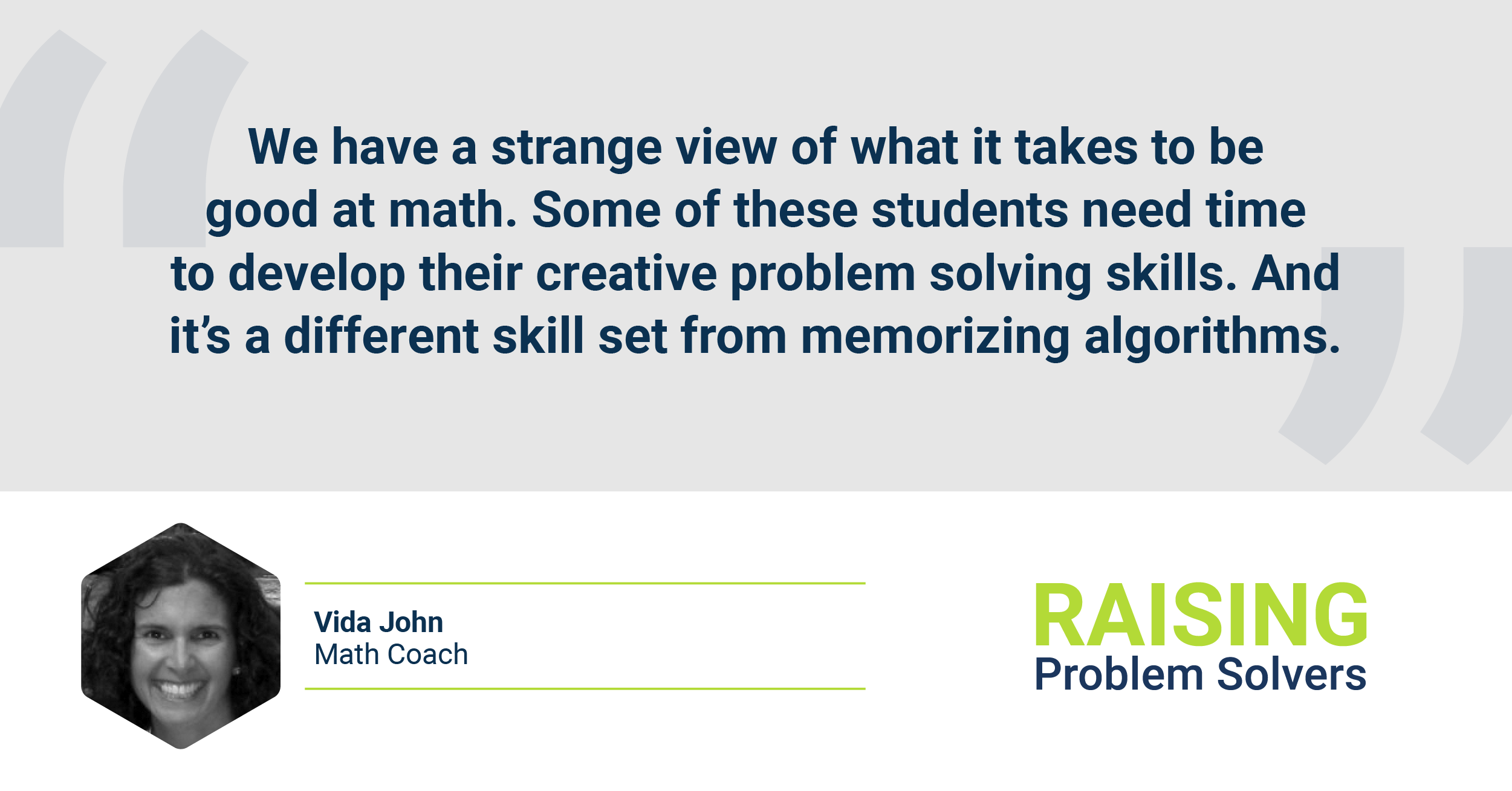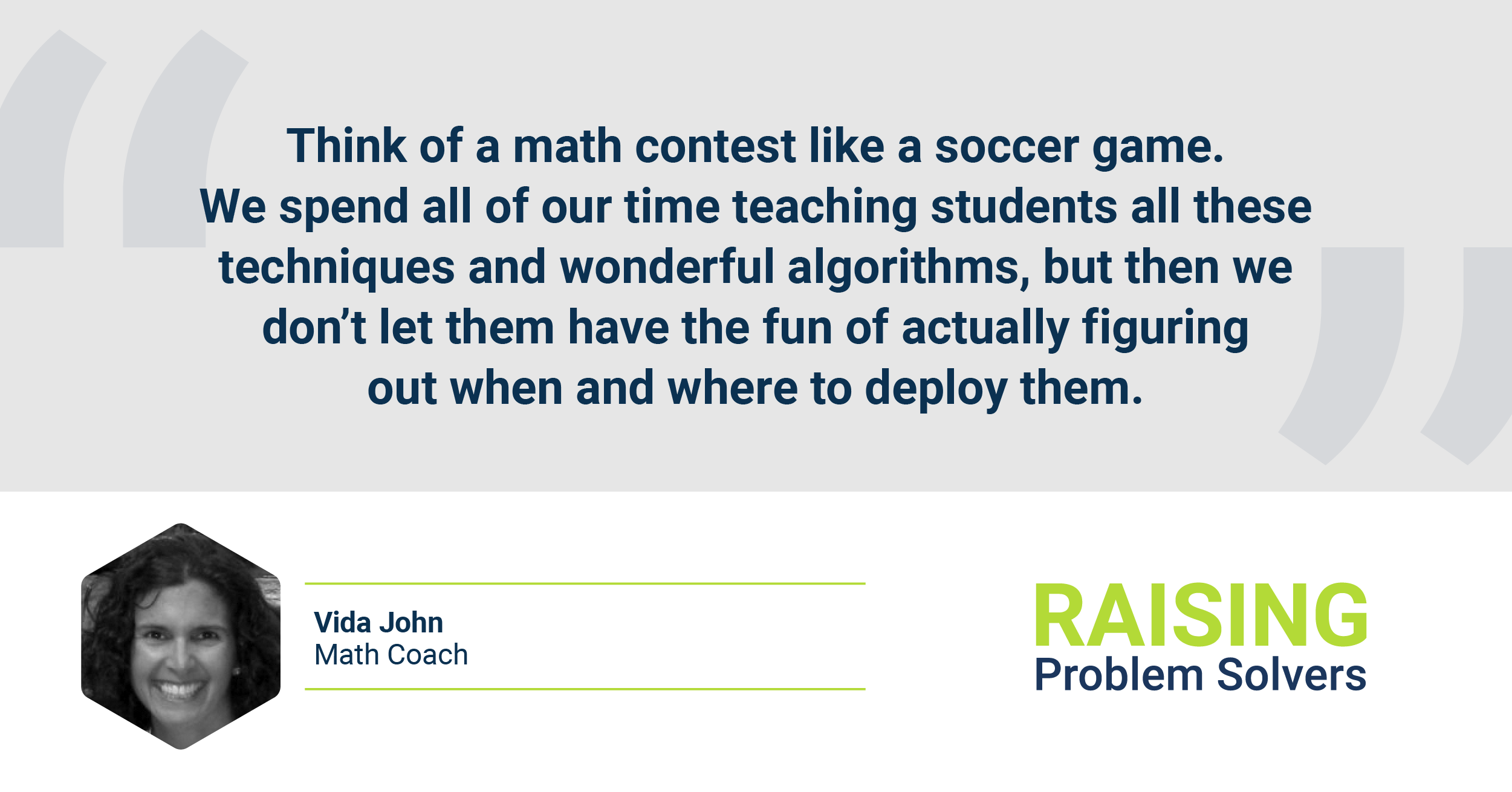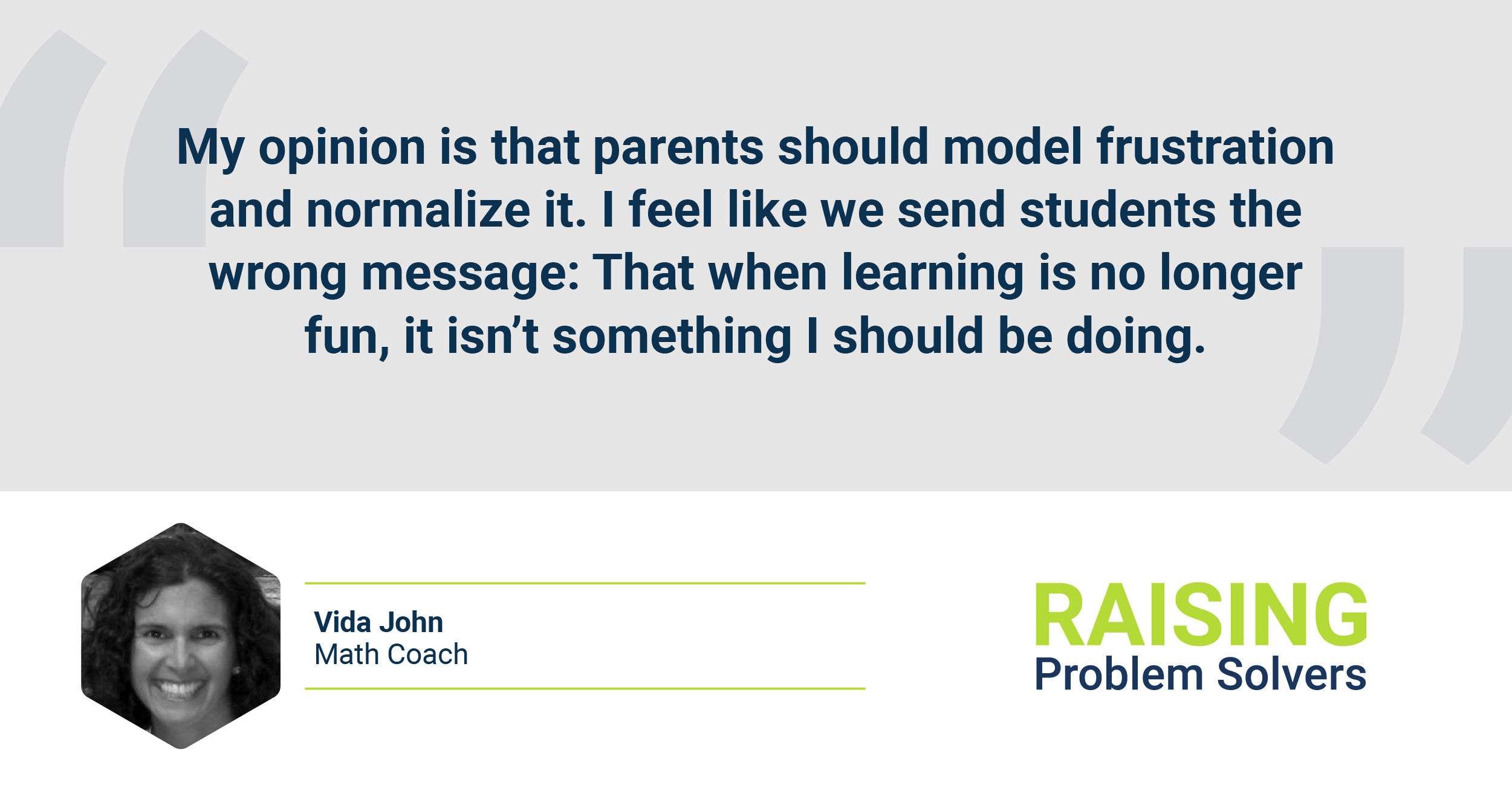Math Coach Vida John talks about the concept of learned helplessness, why math contests aren’t just for really “math’y” kids, and why some students who struggle at math end up becoming the best mathematicians.
Some of the highest achieving mathematical minds were once considered remedial students — a trend stemming from the misguided view that math is about nothing more than memorizing algorithms and techniques.
While memorization is important, if creative problem solving isn’t involved, students will continue to struggle with the feeling of inaccessibility and think math is nothing more than a magical black box.
In this episode, Vida John discusses the idea of learned helplessness and why creative problem solving in novel situations must be prioritized in math if we are to revitalize the subject for the next generation.
Understanding vs. Memorization in Math
In most classrooms, students understand math in terms of cause and effect: If they use a specific sequence, they’ll get a specific result. But they don’t understand the “how” behind it or why it works.
Vida compares it to teaching a student to paint a wall red or blue. If the student isn’t taught to use their techniques creatively, they may never realize that they can combine the two colors to make purple before painting.

Just because a student may resist memorizing algorithms doesn’t mean they cannot find success with math. Vida says she has a student who is a medal-winning International Mathematical Olympiad, a student at MIT, and is planning to get a PhD in physics. This student also spent two whole years learning algebra before they understood it.
Why? The student used that time in algebra developing their creative problem solving skills — a skill completely different from memorizing algorithms, Vida says.
Applied Math Through Contests
“We don't make our students go to soccer practice every day without putting them in a game once in a while,” Vida says. The soccer game is where players get to apply what they’ve learned to new and unexpected situations.
Same with math. Math contests can be a great way for students to apply the math techniques that they’ve learned to novel problems. And the exercise can also help students realize how fun math can be.

If your student is one who doesn’t enjoy competition, there are still ways to help them enjoy the benefits of applied math at home:
- Find problem sets. A lot of old contests are available for free online or in inexpensive books.
- Choose one problem a day to discuss with your student.
- Participate in group work to solve problems. This could be you and your student at a white board in the kitchen. Or some parents organize clubs where students can work together to solve problems.
It’s important to remember that “contest rules are not the boss of you,” Vida says. “Use contests however you like, however best fits your student.”
Normalizing Frustration for Students
There will come a time when helping students solve their math problems will be challenging. Instead of hiding your own frustration, use it as a teaching tool to show students that learning isn’t always fun. It can be awkward and uncomfortable at times, Vida says.
Just like soccer practice, learning math takes hard work and dedication to reach mastery. The sooner students can learn how to navigate this obstacle to stay on track, the more acclimated they will be as they continue to develop and solve the problems of tomorrow. As their teacher, you can set the stage.

Next Steps for Parents
Memorizing math techniques might be necessary sometimes, but make sure you give students opportunities to apply those skills through novel situations like math contests. These practical applications can help students learn that math can be fun.
In those moments of frustration, model it for your student. Show them how to address the feeling and recognize it as a totally normal part of the learning process so they don’t become discouraged and give up on math as a result.
Without the experience of using math practically, the skill will go largely unused. And the world needs more creative problem solvers!
Guest Links and resource recommendations
Elementary
Middle School
--
This episode was brought to you by Art of Problem Solving, where students train to become the great problem solvers of tomorrow.
To get weekly episode summaries right to your inbox, follow the podcast at the bottom of this page or anywhere you get podcasts. Ideas for the show? Reach us at podcast@aops.com.
Episode Transcript
Vida John Q&A [1:29]
Eric Olsen: On today's episode, Vida John, math coach, joins the podcast to talk about the concept of learned helplessness, why math contests aren't just for those really mathy kids, and why some students who struggle at math end up being the best mathematicians.
Vida, talk about the concept of learned helplessness and where you see it most often as a math teacher and tutor.
Vida John: I think that students get the impression in their math classes that mathematics is some magical process. They put numbers into a black box, they press numbers in buttons in a specific sequence, and out comes the right answer, but they don't know why it works, or most importantly, how they can use it to solve novel problems in a novel situation. It's like teaching a student that there's this red paint that they can use to paint things red, and there's blue paint that they can use to paint things blue, but they're never told, "Oh, and by the way, you can combine these colors and make purple, and use these techniques that we've taught you in a more creative way." It's a similar situation in mathematics, where students don't know how to use the algorithms and the techniques they've learned in their math classes in a novel situation.
Eric Olsen: Yeah. At art of problem solving, we typically see students on the higher end of the academic bell curve attracted to our classes and programs. But I was so excited to hear about your examples, tutoring students who had been at least perceived as struggling in traditional math classrooms, but found success at a very high level, with more advanced programs, like AOPs. Talk about those situations.
Vida John: I feel like too many students are being written off too early because they resist this idea of a black box. They resist memorizing algorithms. Let me tell you a story. I had a student who went to the International Mathematical Olympiad and won a medal. He's now a student at MIT, and is planning to get a PhD in physics. This student spent two years studying algebra at art of problem solving, two whole years before he could understand this stuff. And what do we call students like that? We call them remedial students. A student who takes two years to study algebra is bad at math. And now this kid, he's at MIT, and he's going to study the most difficult problems in the world in physics.
Eric Olsen: Yeah. Doesn't sound right. What happened there Vida? What happened?
Vida John: Right. I feel like we really have a strange view of what it takes to be good at math. Some of these students who really want to understand and need the extra time to understand what's going on inside of this magical mathematical black box that they don't understand, they need that time to develop their creative problem solving skills. And it's a completely different skillset from memorizing algorithms.
Are math contests broadly beneficial for a broader audience? [4:34]
Eric Olsen: Yeah. Similarly, talking about the side of math that almost feels magical at some point or inaccessible. Let's talk about math contests, which is one of your specialties. Who do you believe math contests are for? Is this an outlier only activity, or do you think math contests are more broadly useful for a broader range of students?
Vida John: I'm really glad you asked this question because I think more students can benefit from participating in math contests because this is a perfect example of being able to use all the algorithms and techniques they've learned in their math classes in a novel situation. We don't make our students go to soccer practice every day without putting them in a game once in a while. A soccer game where the ball can come from the left or from the right, or from up high, or down low, and all of the skills and techniques they've learned in their practice now, finally, finally, they can decide how to deploy them in a novel situation.
Think of a math contest as like a soccer game. We spend all of our time teaching students all these techniques and wonderful algorithms, but then we don't let them have the fun of actually figuring out when and where to deploy them. So I think more students would actually enjoy doing this type of thing. The problems are a lot of fun. Each problem is different. The first one might be about algebra. The second might be geometry. The third one might be probability. I just think that's a lot more fun than doing 30 problems that are exactly the same, but with the numbers changed.
Some students don't like to compete, and they get disappointed or discouraged. And there's a lot of ways around it. These old contests are available for free on the internet or inexpensive books. And you can deploy them with your students however you like. Some parents will do one problem a day. So it's not about keeping score or getting a high score. It's about a discussion. Some parents will write the problem on a whiteboard in the kitchen. And so students can choose whether to solve it or not, but it's there for discussion. So there's a lot of ways to manipulate the contest problems in such a way that it doesn't seem very competitive.
Some homeschooling parents will organize clubs where the students can work together to solve problems if you have a student who likes group work. But the contest rules are not the boss of you. You can use these contests, however you like, however best fits your student.
Eric Olsen: You mentioned some students being potentially intimidated by contests. What about parents who are equally intimidated by their kids being in math contest when they're not sure they're going to be able to help and support their student? Well, my daughter is going into sixth grade this fall, and she's gotten to the point where if she brings me a homework problem for help, it's no longer a complete no brainer that I'll be able to immediately solve it without thinking about it. She's starting to get to more challenging things. What's your advice to parents who have students in higher level problem solving courses? They might not necessarily be able to do super easily themselves. How can they still help their student be successful?
Vida John: So I don't see this opinion stated very often. So if I get canceled, it will have happened here on this podcast. But my opinion is that parents should model frustration and normalize it. I feel like the pendulum has swung too far in the direction that learning must be fun, because what happens when learning is no longer fun? And I argue that learning is never easy, whether you're in elementary school or grad school. It's awkward. It's uncomfortable. Anything that's challenging is going to be hard to learn. And I feel like we send students the wrong message that when learning is no longer fun, well, maybe this isn't something I should be doing because I'm not enjoying myself because it's hard.
If I may make a comparison to sports, what do your students say when they come home from practice? They say, "Coach was mean. Coach made me run extra laps. I hate coach." But guess what? The next day, they return to practice for more punishment. I don't really understand it, but I think academics, we can learn a lot from sports by not trying to convince students that academics is always going to be fun. Sometimes it's a lot of hard work.
Eric Olsen: Shoot, Vida. I did just check Twitter. You are officially canceled. I'm so deeply sorry to let you know that.
Vida John: Well, it happened here.
Eric Olsen: Really great and challenging thoughts, Vida. Finally, leave us with some next steps advice for parents listening. They definitely want to avoid their students learning helplessness. How should they think about that challenge?
Vida John: Again, keep it novel. Use math contest problems. It's like teaching your students to use purple instead of just red or blue, or the make their own colors. The contest should be not too hard, not too easy. I'll have you include in the show notes some sources of contest problems that parents can get and use with their students. The good news with AoPS, though, is that the contest problems are baked into the curriculum, which makes it really convenient because they're already in there and you don't actually need to do anything else, but that's a plug for AoPS, which I'm a huge fan of because of the math contest angle.
Enroll in AoPS Academy Math and Language Arts Summer Camps [10:07]
Eric Olsen: We'll always take the free plug, Vida. In fact, AoPS Academy’s math and language arts summer camps are the perfect next step for your young math beasts and grammar geeks. Whether you're near our 12 physical learning centers across the country, or want to learn online from our AoPS Academy: Virtual Campus, our engaging summer camps are high rigor, but low pressure. The perfect mental boost to help your student avoid the summer slide while having a whole lot of fun. Visit AoPS Summer Math & Language Arts Camps today to learn more and secure your student’s spot.
Vida John Rapid Fire [10:55]
Eric Olsen: It's now time for our rapid fire segment called Problem Solved where we ask the guest to solve incredibly complex and difficult education issues in single soundbites. Vida, what's one thing about K-12 education you wish you could snap your fingers and problem solved, it's fixed?
Vida John: More contest problems. We don't make our students go to soccer practice without putting them in a game once in a while. We don't teach students math algorithms without having them solve novel problems.
Eric Olsen: If you could go back and give your kid-self advice on their educational journey, what would it be?
Vida John: I'm supposed to be honest?
Eric Olsen: Ideally.
Vida John: Well, if I'm being honest, I would engage in a little bit of time travel insider trading. I might tell myself what companies to invest in and when. It's the truth. You ask me to be honest. I'm sorry.
Eric Olsen: What part of education do you think or hope looks the most different 10 years from now?
Vida John: Sounds like you really want to get me canceled, but I think we really need to discard the learning as fun mantra, and take a more nuanced approach to academic achievement. Learning is uncomfortable, and it feels awkward.
Eric Olsen: Let me quick open up Twitter. Oh, double canceled. Vida, I've never seen such rapid double cancellation.
Vida John: I don't even know if I have a Twitter account.
Eric Olsen: If a tree gets canceled in the forest, but no one's on Twitter to see it, does it actually happen?
Vida John: Nobody cares. Who am I fooling? Nobody cares if I'm canceled.
Eric Olsen: And Vida, what’s your best advice for parents looking to raise future problem solvers?
Vida John: I would encourage them to encourage their students to think less about what schooling can do for them, but ask their students to think about how their education can be put to use to solve the world's problems.
Eric Olsen: And listeners, we'd love to hear your answers as well. So email us at podcast@aops.com with your best advice for raising future problem solvers. And we'll read our favorites on future episodes.
Vida, thanks so much for joining us today.
Vida John: It's a pleasure. I'm a big fan of the podcast.It's a pleasure. I'm a big fan of the podcast.
Episode Summary & Conclusion [12:59]
Eric Olsen: Oh, man, I'm really curious if this episode will convince my daughter to want to get into math contests. I'll keep you posted on that one, but I really loved learning about the concept of learned helplessness. I'm for sure guilty of this in my own life, all the things I tell myself I'm not good at today because for whatever reason, I stopped at the first point of friction. And of course, I don't want my kids to do the same. I want them to do hard things, to want to do hard things, to know that they can do hard things, to not hear the word math contest and go, "Oh, that's for those other kids." So may we embrace the hard, may we model frustration and perseverance, and may you continue your journey alongside us raising the great problem solvers of the next generation. See you next week.

















